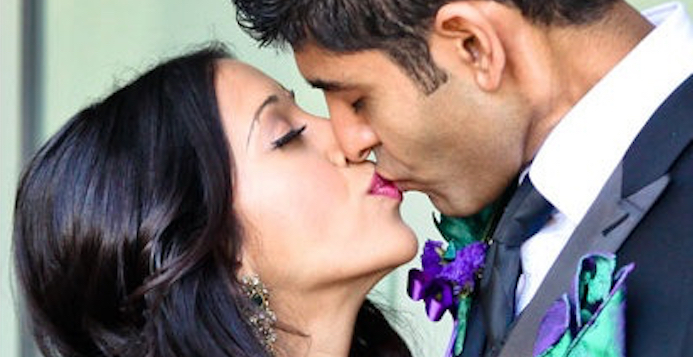Hindu marriage ceremonies are noisy and colorful, filled with symbolism and ritual, and often attended by hundreds of guests. Pradeep, my Indian husband-to-be, thought that I might find the experience overwhelming, and suggested that we have a quiet court marriage instead.
“No way!” I replied. “I want the whole works. I especially want to see you riding in on a white horse!”
A month previously, I’d attended a Hindu wedding where the groom arrived on a decorated white horse, at the head of a procession of family members and friends. A marching band played lively tunes, and the people following the groom danced and laughed. It looked like fun to me.
Pradeep looked a little surprised at my enthusiasm, but hurriedly promised to make it happen. Although it is usually the bride’s family who makes the arrangements for the ceremony, our situation was unusual. We were getting married in India, and neither I or my family had any knowledge about Hindu traditions.
Our wedding three weeks later was a whirl of color, sound and sensation. I was thrilled, though somewhat bewildered, by the experience of being immersed in an entirely different culture. I had no knowledge of the Hindi language, so I could understand very little of what was happening. But I was guided through the many ceremonies by Pradeep’s relatives, and the day passed in a blur of excitement.
After our wedding, Pradeep and I had planned a trip to Rajasthan. I’d been dreaming about this trip for weeks, imagining Pradeep and myself strolling through ancient forts, exploring palaces of the maharajas, and perhaps riding on a camel through the desert. The night before we were due to leave, Pradeep’s sister and her husband came over for tea. Their two-year-old son sat on his father’s lap, gazing solemnly around the room. Pradeep described our plans, and then suddenly said, “Why don’t you come with us?”
I stared at him, open-mouthed. Was he actually inviting his sister and family on our honeymoon?
My brother-in-law replied cheerfully, “We were thinking of the same thing! In fact I’ve already taken a few vacation days from my job. We’ll be ready to go tomorrow morning.”
After the little family had left, I pulled Pradeep aside and hissed, “Why did you invite them? This is supposed to be our honeymoon – a trip for just the two of us!”
Pradeep looked genuinely startled. “But here in India, we always like to go places with family members. I’ve never been on a trip with just one other person.”
We’d landed headfirst into our first cross-cultural conflict. My dream of “just the two of us” had collided with Pradeep’s concept of “the more the merrier”! In that first year of marriage, similar conflicts arose. Sometimes it was an argument about religious traditions, sometimes about history. Pradeep once said: “I hate the British: they were the colonizers of my country!” I replied, “But my extended family is British – how can you hate them all?” We also had the usual conflicts that every married couple faces. I’m untidy, whereas Pradeep is neat. Arguments about capping the toothpaste tube sometimes seemed more urgent than our differing opinions on world politics!
Over time, we’ve gradually ironed out all these cross-cultural conflicts – or at least nearly all of them! We’ve now been married for over 30 years, a relationship that has given us so many special gifts. We feel at home in two worlds, India and Canada. Seeing the world through fresh eyes, we’ve realized that so much apparent difference between people simply evaporates once you develop a connection with them. What a wonderful way to promote peace – by getting to know people personally, across the divides of culture and religion.
So here are our tips for getting the most out of a cross-cultural relationship:
- Cross-cultural relationships will challenge many of the opinions you’ve grown up with. Disagreements are bound to happen! Keep an open mind as you work through these differences.
- Both of you will make mistakes as you navigate a maze of unfamiliar traditions. A sense of humor is a great asset!
- Learn as much as you can about your partner’s cultural background. Challenge yourself to study the language, history or musical heritage.
- Have fun with new skills, such as learning to cook a traditional meal.
- Developing a relationship with your partner’s family can sometimes be difficult, particularly if there’s a language barrier. Be patient!
- Gender roles can also pose challenges. Start a conversation about this issue early in your relationship.
- Participate in your partner’s cultural festivals – you’ll have fun!
- If you have children, help them appreciate both cultural traditions. They may enjoy taking a class in the language, dance or music of your partner’s culture.
- If you and your partner are from different religions, think carefully about your children’s religious experience. How will you guide them in a path that is meaningful, yet accepting of both traditions?
- The final tip: Your love for each other is your greatest strength. Keep that precious flame alight!


































